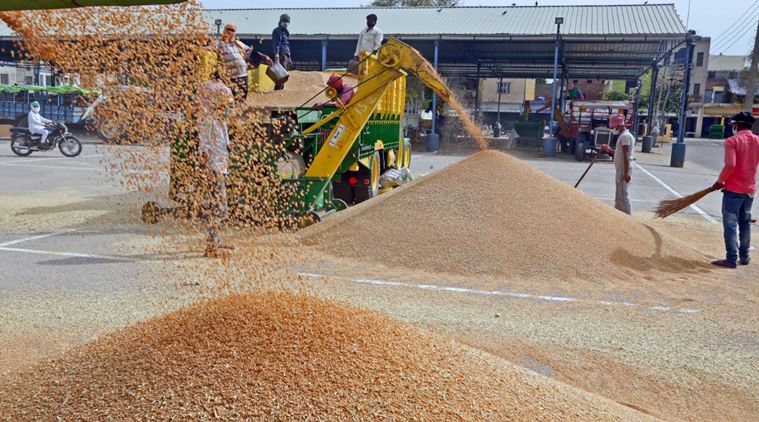 The Finance Minister told The Indian Express that he saw this procurement process as a bright speck for COVID-hit Punjab. (File)
The Finance Minister told The Indian Express that he saw this procurement process as a bright speck for COVID-hit Punjab. (File)
Amid a curfew to check the spread of COVID-19, Punjab’s produce of around 135 lakh metric tonnes of wheat, to be procured at a cost of Rs 26,000 crore, could be a shot in the arm for the state’s economy.
Although the massive procurement exercise is posing a challenge to the government in these times, the Cash Credit Limit (CCL) advanced by the Centre for the procurement would be infused into state’s economy.
Punjab Finance Minister Manpreet Singh Badal had told the state Cabinet during its last meeting that this was a huge amount for the state during this hour of crisis.
Hope for economy
As 60 per cent of population in the state is dependent on agriculture for earning their livelihood, Punjab’s wheat production operations — biggest in the country — are set to get the economic cycle rolling.
The Centre has already advanced an amount of Rs 23,000 crore to the state. The rest of the Rs 3,000 crore would be deposited in state’s account at a later stage. The state government has extended its 22-day long procurement operations into 45 day long operation this time. Also, the number of mandis has been doubled to almost 4,000 from existing 1,800.
The Finance Minister told The Indian Express that he saw this procurement process as a bright speck for COVID-hit Punjab.
“This will be a huge advantage for the state. Out of the whole sad story affecting lives and livelihood, one bright speck for the state would be the next six weeks. The amount of purchase of wheat would be Rs 26,000 crore. In rural economy, if a farmer has money the he purchases stuff from cloth merchant, kiryana merchant and so on. This makes the entire cycle move,” said Manpreet.
He added that during this lockdown, when the industrial production is halted, there is an opportunity for Punjab which has been lent by the hardworking farmers, who ushered the state into the era of green revolution.
“It is also a nature’s way of telling us that crops grow, regardless of this lockdown,” the finace minister sid.
State of finances
The state is reeling under financial losses as its collections have totally dipped. The state is facing a loss of Rs 150 crore every day on account of collections on VAT on petrol and excise duty, GST services, passenger tax, and stamp duty.
Additionally, a loss of Rs 30 crore for Punjab State Power Corporation Limited everyday as the industry was shut and there was not much demand for power. But the state had to pay the fixed cost to the private thermal plants.
On the state of Punjab’s coffers, Badal said, “I feel I am an unfortunate man as a Finance Minister. When the state was coming out of crisis and we were getting back on track, this COVID-19 has hit us hard. We do not know how we would get out of this situation.”
Farmers still worried
While the government sees a hope in the procurement, the farmers are however, losing hope.
“We are getting this amount of money from the Centre to the state but we do not know whether our crop would be procured or not. There is no arrangement. Whatever you see in the pictures and news is just in one per cent of the mandis. The government has got the money in its accounts but we do not know what will happen,” said Sukhdev Singh Kokri Kalan of Bharti Kisan Union (Ugrahan).
Dr Sardara Singh Johal, a noted economist, said by paying Rs 26,000 crore to the state farmers, the Centre had not done any charity. “They give us this amount of money as we produce food for their granaries. This is the cost of that,” he said.